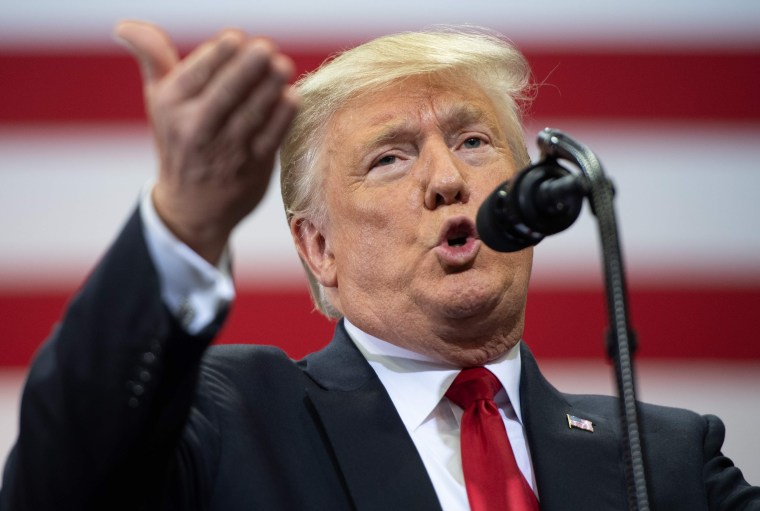This midterm season, it's all about the Benjamins for President Trump. Vote for Republicans and reap the rewards, Trump has said at campaign rallies across the country.
"The decision is so clear all over the country, all over the country. Republicans are for lower taxes, less regulations and more economic freedom. And that's a good thing," Trump said in Wisconsin last week. "The Democrats are for higher taxes, more regulation and more top-down government control."
He's even started promising another tax cut for voters, aimed at the middle class, after the midterms to continue the success of the last. But did the tax cut he signed a year ago actually help his voters as he said it would?
Let's take a look at Trump's midterm pitch, his tax cut promises and the facts.
1. Claim: Tax cuts, GOP policies created lots of jobs
Partially true. Trump routinely ties jobs to his tax cuts on the campaign trail, criticizing Democrats by arguing that the Republican Party is about "jobs not mobs." And while the economy is certainly booming and unemployment is dropping, economists agree that started long before Trump's election; his policies, they say, have helped give it an added boost.
The Tax Foundation, an independent think tank, estimated the Trump/GOP tax bill created a relatively modest 215,000 jobs this year. Kyle Pomerleau, an economist at the Tax Foundation, said similar gains are expected to continue for five to seven years.
Howard Gleckman, a senior fellow at the independent think tank Tax Policy Center, said job gains were steady with the Obama administration's trends, but added that it's possible losses stemming from Trump's tariffs war could erase job gains from the tax cuts.
2. Claim: The stock market boosted your retirement
If you've got a retirement plan, true. Trump has been quick to tout the stock market's gains as something that's good for his voters.
"Think of what will happen to your now beautiful 401-k's!" Trump tweeted recently.
But nearly half of Americans may not have a retirement plan at all. According to the Bureau of Labor Statistics, an estimated 54 percent of people have some kind of workplace retirement plan, like a 401(k) or a pension that are typically at least partially invested in the market.
Some people are reaping the benefits of an elevated stock market, though the daily ups Trump tweets about — and the downs he often omits — aren't typically affecting most Americans, who may not have significant market holdings outside of their retirement plans. The vast majority of stock is held by a small number of people: 84 percent of all stock is owned by the 10 percent richest Americans, according to a 2017 study.
3. Claim: Growth will pay for the tax cuts
Nope. As a candidate and later as president, Trump insisted that enormous growth would pay for the cuts. Already, growth has fallen short of the president's goals. The Office of Management and Budget said last month that they'd revised their forecasts to account for a deficit that's going to top a trillion dollars next year.
This is in part because corporations are spending a significant amount of their tax savings on buying back their own stock, benefiting shareholders.
"It wasn't a surprise to any of us," Gleckman said. "Remember the context that businesses got this big tax cut, this windfall at a time when they were hanging on to an enormous amount of capital. Had they seen the need to make big long-term investments, they already had the money to do it."
Conservatives like Heritage Foundation Policy Analyst Adam Michel, however, argue the corporate buy backs are just temporary.
"Workers are going get the long-term benefit as companies adjust to the newer tax regime and invest," he told NBC News.
4. Claim: 90 percent of Americans got a tax cut, bonuses for millions
True. Immediately after the tax cut, Trump and his allies touted the millions of Americans who would see tax reductions, bonuses and other financial perks. And while year-end tax withholding data is not yet available, according to the Treasury, economists agree that the vast majority of Americans did receive tax cuts.
Millions also got bonuses of some kind. A group that supported the tax cuts, Americans for Tax Reform, gathered 748 examples of "good news" stemming from the tax cuts and the group told NBC News this week that utility bill cuts affected at least 130 million accounts.
Still, economists are quick to note, the bonuses are short-lived and argue they were publicity moves to curry presidential favor.
"That was more of a marketing thing and more of a communications thing from companies than the actual theoretical thing from the Tax Cuts and Jobs Act," Pomerleau said.
5. Claim: Tax cuts helped working families
Not as much as they helped corporations. "We have eliminated a record number of job-killing regulations and passed a massive tax cut for working families," Trump said in Charlotte, North Carolina, last week.
Yes, working families likely did get a tax cut, but the biggest beneficiaries of the tax bill are corporations, who have lasting cuts while individual tax cuts expire in 2025.
"And we will soon follow up with another 10 percent tax cut for the middle class,” the president continued.
It's perhaps telling that Trump is promising another tax cut for middle-class voters, because while the majority of Americans did see a tax reduction, most don't feel like they did: A CNBC poll in March found that just 32 percent of the public felt like they were seeing more in their paychecks.
Fundamentally, economists say, the tax cuts were significant for corporations and modest for individuals. While conservatives hope those boons will trickle down to lower income Americans, that's yet to happen.
